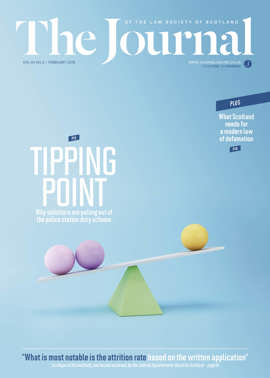Public policy highlights
The Society’s policy committees have had a busy month analysing and responding to proposed changes in the law. Key areas are highlighted below. For more information see The Research and Policy section of the Law Society website.
Brexit
The Society submitted a briefing on the Taxation (Cross-border Trade) Bill ahead of the House of Commons second reading debate on 8 January. It highlighted the importance of ensuring that the scope of delegated powers is not wider than is necessary to achieve the objectives of the bill. It also suggested that there should be an obligation to consult on any regulations to be introduced, to ensure meaningful stakeholder engagement.
A further briefing on the Trade Bill was submitted ahead of its second reading debate on 9 January. The key themes addressed included concerns regarding the extensive proposed delegated powers, the clarity of drafting, and issues which need to be addressed to ensure effective engagement and co-operation with the devolved administrations.
In addition, the Constitutional Law Committee issued a briefing and proposed amendments together with reasons and effects, in respect of the European Union (Withdrawal) Bill ahead of its second reading in the House of Lords on 30 and 31 January 2018.
Offensive Behaviour etc (Repeal) Bill
The Criminal Law Committee issued a briefing on the Offensive Behaviour at Football and Threatening Communications (Repeal) (Scotland) Bill ahead of the stage 1 debate on 25 January.
While the question of repealing the Act is a matter for the Scottish Parliament, the committee does not think its repeal will leave any gap in criminal law. It raised the ongoing difficulties with ss 1 and 6. Repeal of s 1, alone or as part of a package of amendments to the 2012 Act, will not leave any gap as existing measures will capture any relevant offending behaviour. In relation to s 6, it does not consider this offence to be an improvement on the common law and various statutory provisions that were previously available.
Scottish court fees 2018-2021
The Access to Justice and Mental Health & Disability Committees submitted a joint response to the Scottish Government’s consultation on Scottish court fees 2018-2021. It is proposed that court fee levels are increased by 2.3% with effect from 1 April 2018 to reflect inflation, followed by a further 2% from 1 April 2019 and 2% from 1 April 2020.
Current Scottish Government policy is that litigants should meet the cost of the court service, and therefore court fees should move to a position of seeking full cost recovery. The Society does not support this aim, and remains of the view that moves towards full cost recovery should be resisted. A properly funded court system is an essential part of our civilised society and respect for the rule of law, and it is in the public interest to maintain a robust and respected system for resolving disputes. It is the proper responsibility of the state to fund that system.
Competition & Markets Authority
The Competition Law Committee responded to the Competition & Markets Authority (CMA) consultation on its draft annual plan for 2018-19.
The committee welcomed the commitment to strengthening the CMA’s presence in Scotland with an expanded office. It makes sense that competition issues which are of significant importance in Scotland and directly affect Scottish consumers should be dealt with by locally engaged staff. The committee looks forward to working collaboratively with the new team as appropriate.
In a response to the House of Lords inquiry into the impact of Brexit on UK competition policy, the committee emphasised the importance of ensuring that the impact on the specific Scottish market is taken into account in assessing the competition law implications of a particular case. A new Scottish office could help to ensure that such cases are reviewed from the devolved perspective.
The Policy team can be contacted on any of the matters above at policy@lawscot.org.uk or on TwitterIn this issue
- Enforceable rights or progressive policy goals?
- Data processors beware: GDPR holds you responsible too
- Insolvency in a post-Carillion world
- Employee ownership: a strategy that fits
- A mediation Act? The Irish experience
- Journal magazine index 2017
- Reading for pleasure
- Opinion: Andrew Tickell
- Book reviews
- Profile
- President's column
- Digital progress given go ahead
- People on the move
- Tipping point for legal aid?
- Arrest: all change
- Legal software: are you still listening to Gangnam style?
- Defamation law for the digital age
- Choosing our judges: could we do it better?
- A journey through trust compliance
- The Cashroom: 10 years of service
- From dockets to defences
- Sex discrimination runs deep
- Wealth not a bar to s 28 claims
- No spying on the job
- Scottish Solicitors Staff Pension Fund: not the final instalment?
- Scottish Solicitors' Discipline Tribunal
- The Clark Foundation for Legal Education
- LBTT's birthday alert
- Doing all the white stuff
- Solicitor's CBE for life of service
- From the Brussels office
- Paralegal pointers
- Public policy highlights
- The kindest cut
- Wish list for the review
- Benchmarking: take the benefits
- Tax evasion: don't get caught up
- Ask Ash
- Time to call out harassment
- Q & A corner






